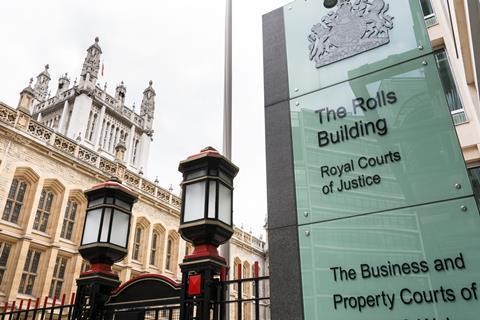A law firm has failed with a court bid to prevent the advertisement of a winding up petition from its disbursement funder. Specialist Lending Limited, trading as Duologi, wanted to issue a petition against South Wales firm Bridger & Co following a statutory demand for payment of around £2.2m.
The parties had made a disbursement funding agreement for cavity wall insulation claims and the financial dispute arose over whether Duologi was entitled to be repaid after two years or whether payment was restricted to recoveries from the claims.
The funder served a statutory demand in May but the firm applied for an injunction to prevent the publicising of the subsequent winding up petition.
The firm’s director Philip Bridger argued in court last week that Duologi had misrepresented the position over the funding agreement to the point where Bridger & Co was ‘induced’ to enter it. He submitted that '24 months' had only been inserted into the agreement because it needed to have an end date and that he expected the claims to be concluded sooner. If the cases took longer to settle, Bridger said that Duologi had assured the firm it would not be ‘heavy handed’.
In Bridger & Co Limited v Specialist Lending Limited (t/a Duologi), Deputy ICC Judge Curl KC said the firm’s argument ‘does not make sense’ and that the inclusion of a two-year end date was recognition that at some point sums would need to be repaid if the claims had failed.
He added: ‘The representation that the petitioner would not be heavy handed if the CWI claims took longer than 24 months to pursue does not say or imply, in my judgment, that the petitioner would not be entitled to have recourse against the company if sums were unpaid.’

Probed by the judge about what would happen if the firm simply halted the claims, Bridger told the court that the funder would still have no recourse to be paid. The judge said this approach suggested that Duologi was expected to take on all the risk, while the firm made a risk-free profit even if the claims are unsuccessful or abandoned.
Bridger said the performance of the funding agreement had been frustrated by various factors, including ATE insurance, the availability of experts and the Covid lockdown. These were all rejected by the court.
The judge declined to make an injunction to restrain advertisement. A notice of a petition to wind up Bridger & Co was advertised in the London Gazette the day after the hearing. The petition will be heard in the Rolls Building next week.
This article is now closed for comment.



























8 Readers' comments